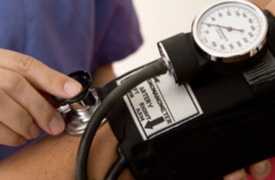
High blood pressure, also known as hypertension, poses a significant problem for countless members of modern society. High blood pressure is directly linked to many of the country's leading causes of death, such as stroke and heart attack. This condition should be treated immediately in order to prevent the body from becoming further damaged by its detrimental effects. High blood pressure occurs when your arteries become unable to process a regular flow of blood through your body. Various factors, such as a build-up of fat in your body cells or a restriction of your arteries' diameters, force large quantities of blood through a very small opening. This places immense stress on your artery walls, eventually causing them to rupture. High blood pressure can be caused by a number of different factors. First of all, hypertension is simply genetic in some people. If genetics are the source of your high blood pressure, then medications might be necessary in order to bring it under control. Other common sources of hypertension include obesity, a high-sodium diet, excessive alcohol consumption, chronic stress, and smoking. This is why so many health care professionals advocate a well-rounded, healthy lifestyle. People who eat a healthy diet, who abstain from smoking and high alcohol consumption, and who exercise regularly tend to have much healthier blood pressures than those who do not. If you fail to bring your high blood pressure under control, then you could suffer numerous health issues later in life. Phenomena such as strokes and heart attacks can strike viciously and without warning. Certain organs of your body might also face permanent damage. For instance, brain function, vision function, and kidney function can all be impaired by consistently high blood pressure. Thankfully, high blood pressure is relatively easy to treat in most people so long as you are able to adhere to the guidelines that your doctor recommends. Usually, hypertension can be alleviated with a simple lifestyle change. If you exercise more, eat a well-balanced diet, and quit smoking, your blood pressure levels will usually improve. Your doctor might also prescribe blood pressure regulation medications in order to keep close tabs on your body's condition. High blood pressure is a very dangerous medical condition, but it can be controlled if you dedicate yourself to a healthy lifestyle. People suffering from hypertension should do everything they can in order to bring their blood pressure levels to a healthy state.
What else can I help you with?
High blood pressure is the major risk factor for?
stroke
When the blood pressure gets high the person will have an increased risk of?
If you have high blood-pressure, there is an increase in the risk of either a stroke or a heart attack.
Am I at risk for high blood pressure because I have o type blood?
No particular blood type is at more risk for high blood pressure than any other type. It is mostly stress, diet, and genetics that affect blood pressure.
What do health claims specialist do?
Diets high in sodium may reduce the risk of high blood pressure. Diets low in potassium and high in sodium may reduce the risk of high blood pressure and stroke.
Lifestyle Considerations in High Blood Pressure?
High blood pressure is a major risk factor for heart attack. Since it's so closely related to diet and lifestyle, controlling high blood pressure means controlling diet and lifestyle as well. The major factors that make a person at risk for high blood pressure are lack of exercise, stress, smoking and a high salt, high sugar, high fat and low fiber diet. To control high blood pressure the person should exercise, stop smoking if they do so, increase the plant foods in their diet and decrease their intake of fat and sugar. A high blood pressure reducing diet might be cold water fish like salmon, leafy green vegetables like kale or spinach, and citrus fruits.
What is primary secondary prevention for high blood pressure?
primary prevention for high blood pressure is educating people who are high risk on how to avoid high blood pressure. secondary prevention is screening for those who may have high blood pressure and intervening early before its too late.
How is high blood pressure a risk factor for ischemia?
High blood pressure makes the heart work harder, and with time, weakens it. When combined with obesity , smoking, high cholesterol levels, or diabetes, the risk of heart attack or stroke increases.
Who is at risk of suffering from the heart attack disorder?
People who have high blood pressure.
What lowers your risk of heart disease and high blood pressure and osteoporosis?
cheerios
What are high blood pressure health risk?
The most important is infarctus myocardii.
What are some problems with having too much sodium in your diet?
lead to high blood pressure (a major risk factor for stroke, heart disease and kidney disease)
Health risk associated with high blood pressure?
CVA (cardiovascular accident) or Stroke
